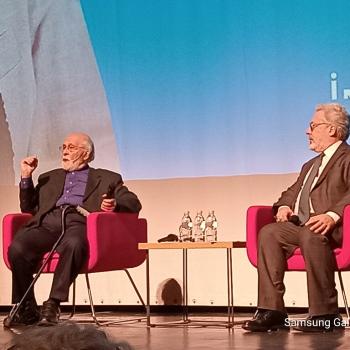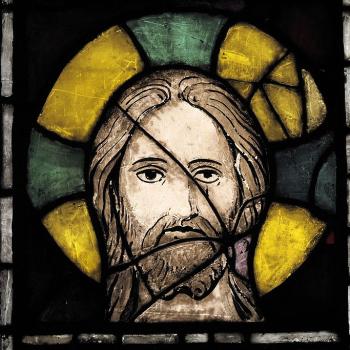It is common in the modern field of apologetics to be promoted by debates, and through such debates, so-called apologists learn to dismiss what their opposition has to say instead of sitting down, listening, and learning from them. While, in theory, the field of apologetics can do quite a bit of good, if it truly seeks what is true and offers to explain what others have erroneously misunderstood, many, if not most, who become apologists seek to speak in order to gain praise and glory more than they do in order to truly understand and defend the truth. The reality is that the truth is not only difficult to discern, but often, it is inconvenient, and when apologists hear something inconvenient, they would rather ignore it than engage it and modify their own understanding because of it.

That is one of many problems which can be found in apologetical circles. Certainly, not all apologists are guilty of this. Indeed, we can look through history, and find many great and influential apologists who, far from being unbending, modified their presentation and beliefs in accordance to whatever new insights they gained from listening to those who criticized their beliefs. Nonetheless, especially when people engage apologetics as a profession, this becomes a distinct problem. Many apologists learn that they have to market themselves, and it becomes next to impossible for them to do so if they are seen continually accepting arguments from their opponents. They would rather be shown refuting their critics than losing face within their own community. This is especially true when apologetics is done through debates; apologists think it appears weak, and they will lose the debate, if they admit their opponent has something to offer.
Sadly, because of how the field of apologetics has emerged in recent times, it often appears that apologetics are sophists, caring more about appearances and the kinds of rhetorical arguments they can make than they are about the truth. They market themselves as being concerned about the truth, but the way they act and interact with others, demonstrates they care more about defending their own reputation and honor than the truth itself.
This generalization must not be seen as indicating all apologists are sophists. Indeed, historically, when they were not interested in marketing themselves, many apologists were so interested in the truth that they showed how much they learned from their opponents, willing to accept what critics of the Christian faith had to say. This is not to say apologists tended to have major changes in their opinions as a result of their engagement with critics, but they recognized the fact that their opponents often were also interested in and pursued the truth and they had much to offer as a result.
An example of this can be found in the reaction of Christians to Platonists like Porphyry. Platonic opponents of Christianity often criticized the way Christians addressed their monotheism in respect to Platonic polytheism. The Platonists said they could agree upon the existence of one supreme God over all, the Platonic One, but then the Platonists suggested that around that God were other celestial beings, gods and daemons who relied upon and came from that One God. They said that Christians, despite all their contention with polytheism, agreed in principle, if not in words, with the Platonic map of reality. The problems which Christians had with polytheism they agreed were serious issues: there had to be One God over all, but underneath that God, instead of talking about multiple gods like the Platonists, Christians talked about angels. These angels, Platonists pointed out, were the gods they talked about, but now with a different name. Thus, Macarius recorded one such argument (which probably came out of Porphyry):
For if you say that angels stand beside God, being impassible, immortal, and incorruptible in nature, which we term “gods” on account of their nearness to the Godhead, what does this dispute about the name amount to, beside the conclusion that the difference is only of nomenclature? For she who is called “Athena” by the Greeks, the Romans call “Minerva,” but the Egyptians, Syrians, and Thracians name her differently. Certainly nothing is changed or detracted from the appellation of “god” by the difference in name. Now, whether one names them “gods” or “angels,” the difference is no great thing, since their divine nature is testified to When Matthew writes thusly: “And Jesus replying, said, ‘You err, not knowing the Scripture or the power of God, for in the resurrection they will neither marry or be given in marriage, but they will be as angels in heaven.”[1]
The point the Platonists were making was that the Platonic form of polytheism (and, likewise, many other forms of polytheism), did not exactly fit the characterization given by Christians. Monotheism is about there being one supreme and ultimate eternal principle from which all things have been made, and the Platonic tradition recognized this as the One. On the other hand, around that One, Platonists and Christians alike accepted that there are spiritual beings who are closer to God in their nature than humanity, and these beings, recognized for their greatness, have been given many names, include “god” because of their closeness to the One. They are not to be seen as competing with the One, and so the truth expressed by monotheism is affirmed. This is not to say Christians were wrong in rejecting crude forms of polytheism, but the Platonists wanted the Christians to realize that not all forms of polytheism suffer from the defects Christians discuss when debating polytheism.
Many Christians were unable to listen to and understand what the Platonists were arguing about. They only saw the word “god” being discussed in relation to various spiritual beings, and so they argued against the Platonists in a way which had nothing to do with Platonic beliefs. Their arguments, it can be said, were based upon equivocation. However, some Christians did see that the issue was merely one of names, and so their position became one with the Platonic counterpart, saying that what many Platonists (and other pagans) called gods and daemons were merely the angelic servants of God mentioned in Scripture. Thus, Calcidius, in his commentary on the Timaeus, accepted this connection between gods, daemons, and angels:
And to this class belongs the ethereal one which we mentioned as being placed at the second level. The Hebrews call them holy “angels” and say that they stand in the presence of the venerable God’s contemplation, with the highest degree of prudence and acute intelligence, also a wonderous tenacity of memory, devoting themselves with the highest degree of wisdom in their service to divine concerns while prudently aiding human ones – at once observes and executors, and called “demons” [daimones], I suppose, as though it were daêmones [knowers]: the Greeks refer to those who are all-knowing as daêmones. And we should hold, first, that these beings who have been given great responsibility for the sensible world imitate in a sense the one whose place they hold (for as god is to an angel, so the angel is to a human being), and, second, that they perform for us the service of interpreting and reporting our prayers to god and likewise of interpreting and reporting god’s will to humans, revealing to him our needs and bringing divine aid down to us, the assiduous task of reporting being the reason for their being called “angels.”[2]
The importance of Calcidius’ text cannot be underestimated. He was given charge to translate the Timaeus into Latin and then explain its contents to its readers from Ossius of Cordova, the bishop who presided at the Council of Nicea and heled write the Nicene Creed. Even though he did not finish the work, for centuries it was the main text Latin reading Christians had on hand to know about and understand Plato and his cosmology. Interestingly, despite the growing Christian understanding of “daemons” to being purely evil beings, Calcidius understood it to be a category of spiritual being, pointing out that we must be careful when reading ancient writings about them, not to assume they are evil in and of themselves:
Nor should the name by virtue of its being imposed indifferently upon good and evil beings be for us a cause of concern, for the name “angels” occasions no concern even though some angels are God’s servants (and those who are, are called holy) but others minions of the adverse power, as you know perfectly well; hence, according to the custom of speaking adopted by the Greeks “demons” are as likely to be holy as polluted or tainted.[3]
Calcidius was pointing out that Christians must be careful in reading pre-Christian discussions about daemons, for many of those beings were really what Christians would call “angels” because of their relationship with God. That is, far from being purely evil spiritual beings, which is what the word daemon would eventually become associated with, it was originally a word to describe a category of spiritual beings, which could then be good or evil.
Now, to be sure, by the nature of his enterprise, Calcidius was not writing as an apologist but rather as a scholar, seeking to learn from and understand Plato and translate that knowledge for those who could not go to original Platonic sources. This could explain why he did not fight against but rather welcomed the connections which could be made from Platonic philosophy with Christian theology, but it must be understood those who came after him would use his work and ideas for apologetical purposes and so would be set up to be ready to learn from and accept what they can from the Platonists.
Thus, we find, Christians who were much more educated, even when they engaged apologetics, were able to follow Calcidius in accepting much from the Platonic tradition, including the way in which they discuss the gods. Perhaps no better example of this can be found than with St. Augustine in his City of God:
If the Platonists prefer to call these angels gods rather than demons, and to reckon them with those whom Plato, their founder and master, maintains were created by the supreme God, they are welcome to do so, for I will not spend strength in fighting about words. For if they say that these beings are immortal, and yet created by the supreme God, blessed but by cleaving to their Creator and not by their own power, they say what we say, whatever name they call these beings by. And that this is the opinion either of all or the best of the Platonists can be ascertained by their writings. And regarding the name itself, if they see fit to call such blessed and immortal creatures gods, this need not give rise to any serious discussion between us, since in our own Scriptures we read, “The God of gods, the Lord has spoken;” and again, “Confess to the God of gods;” and again, “He is a great King above all gods.” And where it is said, “He is to be feared above all gods,” the reason is immediately added, for it follows, “for all the gods of the nations are idols, but the Lord made the heavens.” He said, “above all gods,” but added, “of the nations;” that is to say, above all those whom the nations count gods, in other words, demons. By them He is to be feared with that terror in which they cried to the Lord, “Have You come to destroy us?” But where it is said, “the God of gods,” it cannot be understood as the god of the demons; and far be it from us to say that “great King above all gods” means “great King above all demons.” But the same Scripture also calls men who belong to God’s people “gods:” “I have said, You are gods, and all of you children of the Most High.” Accordingly, when God is styled God of gods, this may be understood of these gods; and so, too, when He is styled a great King above all gods.[4]
Interestingly enough, Augustine even pointed out how Scripture affirms the Platonists in their nomenclature. He did not think Christians should fight with pagans when they had nothing to fight about other than word choice. Instead of responding to Platonists in their criticism of Christian treatment of polytheism by showing why they were wrong, Augustine said it is best to accept their criticism and move on instead of fighting with them. He understood that what is important is the meaning which is being discussed, and not the words themselves; this is not to say words are meaningless, but because of the potential variety of meanings contained in them, arguing through equivocation only renders those who make such arguments into sophists instead of people pursuing the truth. It is possible for one to explain one’s words choice, when necessary, but in doing so, it is best to accept alternative word choices so long as the meaning is the same.
What Augustine shows us that it is better to admit when someone else, including a critic of our own beliefs, have truths in common with us than it is go on and on debating them on every point they make. It is better for apologists to not always be on the defense, but actually to be looking for and pursue the truth wherever it could be found. St. Justin Martyr, in his apologies, demonstrated this drive, as he pointed out how many pagan philosophers, among which Socrates was one, pursued the truth and so could be seen as followers of Christ with the Christians; certainly Justin could and did respond to critics when they said something erroneously, but he did not believe that those in opposition to him were completely cut off from the truth. This is what true apologetics should be about. A good apologist should be able to accept just criticism from their opponents and apply it when needed, instead of shrugging it off. Augustine, in his City of God, certainly was acting as an apologist, defending Christianity from the claim of being responsible for the fall of Rome, but in doing so, he pursued the truth wherever it could be found, and showed his acceptance of much which could be found within pagan sources. This kind of apologetics is what is lacking today, and it is this reason why many Christians, relying upon apologetics for their education, have a faulty understanding of the truth. For such Christian then learn half-truths and misrepresentations of the other while, allowing them to give an erroneously triumphalistic, interpretation of their own tradition. It might help convince some Christians to remain Christian, but once the truth is known, many Christians might leave the faith having felt lied to by those they followed, and non-Christians will far less likely take what Christians have to say seriously because they have shown themselves uninterested in the truth.
[1] Macarius, Apocriticus. Trans. Jeremy M. Schott and Mark J. Edwards (Liverpool: Liverpool University Press, 2015), 246-7.
[2] Calcidius, On Plato’s Timaeus. ed. and trans. John Magee (Cambridge, MA: Harvard University Press, 2016), 339.
[3] Calcidius, On Plato’s Timaeus, 341.
[4] St. Augustine, City of God in NPNF1(2):178. [IX.23].
Stay in touch! Like A Little Bit of Nothing on Facebook.
If you liked what you read, please consider sharing it with your friends and family!












